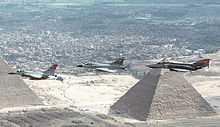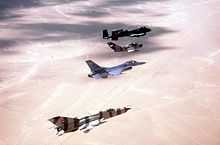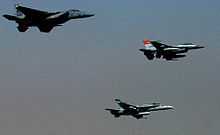Operation Bright Star



Operation Bright Star is held every two years. It is a series of combined and joint training exercises led by American and Egyptian forces in Egypt. These exercises began in 1980, rooted in the Camp David Accords. After its signing, the military forces of Egypt and the United States agreed to conduct coalition training in Egypt.
They are designed to strengthen ties between the Egyptian and the United States Central Command and demonstrate and enhance the ability of the Americans to reinforce their allies in the Middle East in the event of war. These deployments usually are centered at the large Cairo West Air Base. During the period following the liberation of Kuwait (Operation Desert Storm), these exercises have grown larger and have included as many as 11 countries and 70,000 personnel. Other allied nations joining Bright Star exercises in Egypt include the United Kingdom, France, Germany, Italy, Greece, the Netherlands, Jordan, Kuwait, the United Arab Emirates.
The exercise begins with coalition interoperability training to teach nations how to operate with one another in a wartime environment, then continues with a Command Post Exercise designed to help standardize command and control procedures, and then a large-scale Field Training Exercise to practice everything together.
Early exercises

The first exercise was conducted from September to December in 1980. U.S. Army units (Task Force "Strike", 1st Battalion, 502nd Infantry Regiment) of the 101st Airborne Division (Air Assault) and U.S. Air Force personnel were deployed in Egypt for the exercise. The following year, a similar exercise was held using the same ground rules. USS Coral Sea took part in 1982.
By 1983, the size of the forces involved prompted planners to hold the event every two years rather than annually. The exercise went under further evolution in 1985 with the inclusion of the American and Egyptian Air Forces. The two nations' respective navies and special forces joined the exercise in 1987.
The Associated Press, in a story dated August 4, 1985, said that U.S. forces would begin their largest exercise in the Middle East ever that day. Egypt, Somalia, Jordan, and Oman were reported as participating.[1]
Egypt's Information Ministry confirmed that Bright Star began in Egypt on schedule with activation of command centers and some movement of troops into maneuver areas. A Pentagon spokesman in Washington said about 9,000 Americans would take part in the weeklong Egyptian phase, the main part of the exercise. The spokesman said an unspecified smaller number of American soldiers would take part in Somalia and about 520 would join in the Jordanian portion. Pentagon sources in Washington said a smaller number of Americans would also train in Oman ..
After the 1989 event, the exercise was moved from the summer to the fall. The Bright Star exercises are named after the fiscal year during which they occur; consequently, they take place in the calendar year before their number would indicate. For example, Bright Star 95 actually took place in the fall of 1994.
Bright Star 95
In the Autumn of 1995, nearly 60,000 troops took part in the revived Bright Star Exercise, which included nations other than Egypt and the United States for the first time.
Bright Star 97
During the 1997 exercise, the U.S. Air Force encountered a fuel shortage. Their Egyptian counterparts demonstrated an ability to blend Jet A-1 fuel with additives to produce the JP-8 required by U.S. aircraft.
Bright Star 98
The 1998 event focused on naval and amphibious warfare. It included the USS George Washington, USS John F. Kennedy Battle Groups and the Guam Amphibious Ready Group.
Bright Star 2000
The largest Bright Star exercise took place in October and November 1999, involving 11 nations and 70,000 personnel. An additional 33 nations sent observers to monitor the exercise: Algeria, Australia, Bahrain, Belgium, Burundi, Canada, China, Congo, Greece, India, Kazakhstan, Kenya, Kyrgyzstan, Morocco, Nigeria, Oman, Pakistan, Poland, Qatar, Romania, Russia, Rwanda, Saudi Arabia, South Africa, Spain, Syria, Tanzania, Tunisia, Turkey, Uganda, Ukraine, Uzbekistan, Yemen, and Zimbabwe
The exercise scenario involved a fictional hostile nation named "Orangeland" invading Egypt and trying to take control of the Nile River. The exercise coalition worked together, practicing fighting in the air, land, and sea domains, to defend the Nile and expel Orangeland.
A key piece of the training was a six-nation amphibious assault led by the Royal Navy.
Bright Star 02
Despite the September 11, 2001 terrorist attacks, the U.S. sent 23,000 troops to participate in Bright Star in October and November 2001. Elements of the 1st Infantry Division and 3rd Armored Cavalry Regiment joined coalition partners to continue strengthening U.S.-Arab ties.
Forces from France, Germany, Greece, Italy, Jordan, Kuwait, Spain the United Kingdom and Egypt participated in the event.
It was the first time in the history of the United States that a military exercise was executed under Force Protection Condition 'Delta'.
Quartermaster Professional Bulletin Spring 2002 gives detail about the efforts of the 559th Quartermaster Battalion to support Bright Star 01.
The National Command Authorities deemed this exercise so important that it continued the operation which began just days before terrorists struck targets on American soil on September 11, 2001.
Bright Star 04
The U.S. did not participate in the exercise scheduled for Fall 2003 due to high military commitments in the Afghanistan War and the Iraq War.
Bright Star 06
Bright Star 06 began on September 10, 2005 and ended October 3, 2005. The Pennsylvania Army National Guard’s 28th Infantry Division (Mechanized) was put in charge of the field training exercise. Units participating included 28th ID’s 104th Cavalry Regiment, Marines from the 13th Marine Expeditionary Unit, mechanized infantry from Jordan, and a tank company from Egypt. In addition, 11 Airmobile Infantry Battalion Garderegiment Grenadiers en Jagers of the Royal Netherlands Army deployed to Egypt for the exercise.[2] Also among the many military units was the 256th Combat Support Hospital which is an Army Reserve unit from Columbus, Ohio. The 256th CSH was the first reserve unit to be invited to be a part of Bright Star, and served in support of the many jump operations conducted.
Bright Star 08
Among the U.S. participants for Bright Star 08 were the 42nd Infantry Division of the New York Army National Guard, the only U.S. National Guard division headquarters to have deployed to Iraq at that time, and the 48th Brigade Special Troops Battalion of the Georgia Army National Guard.
Bright Star 10
Bright Star 10 took place in October 2009 which included a strategic airborne jump of more than 300 Soldiers from the 82nd Airborne Division partnering with Egyptian, German, Kuwaiti, and Pakistani paratroopers, while more than 1,000 Marines from the 22nd Marine Expeditionary Unit rolled onto El Alamein Beach by amphibious landing with their Bright Star counterparts.[3]
Also more non-traditional training took place during the operation and included a combined computer aided command post exercise introducing partnering soldiers to each other's equipment and updated tactics, thereby developing a better coalition contingency environment.[3]
Bright Star 12
Bright Star 12 was postponed due to the Egyptian Revolution of 2011.[4]
Bright Star 14
Bright Star 14 which should have taken place in September 2013 was cancelled by U.S president Barack Obama after Egyptian police raided two large encampments by supporters of ousted president Mohamed Morsi in Cairo to forcibly disperse them, after six weeks of unauthorized sit-in[4]
Footnotes
- ↑ AROUND THE WORLD: GI's in the Mideast Start Big War Games, Associated Press, New York Times, August 5, 1985
- ↑ Leo van Westerhoven (8 September 2005). "Oefening Bright Star 2005, Grenadiers vooraan in zinderend Egypte". www.dutchdefencepress.com. Retrieved 11 August 2012.
- ↑ 3.0 3.1 Operation Bright Star begins October 16, 2009. Retrieved 2011-02-11.
- ↑ 4.0 4.1 http://www.telegraph.co.uk/news/worldnews/northamerica/usa/10246508/Barack-Obama-cancels-Operation-Bright-Star.html
References
| Wikimedia Commons has media related to Bright Star. |